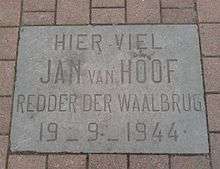Jan van Hoof
| Jan van Hoof | |
|---|---|
| Born |
Jan Jozef Lambert van Hoof 7 August 1922 Nijmegen, the Netherlands |
| Died |
19 September 1944 Nijmegen, the Netherlands |
| Cause of death | executed by German military |
| Resting place | Algemene begraafplaats Vredehof, Nijmegen |
| Nationality | Dutch |
| Education | Catholic University of Nijmegen |
| Occupation | Student |
| Known for | Operation Market Garden |
Jan Jozef Lambert van Hoof (Nijmegen, 7 August 1922 – Nijmegen, 19 September 1944) was a member of the Dutch resistance in World War II, where he cooperated with Allied Forces during Operation Market Garden, and was executed in action. Before and during the war, Van Hoof was a Rover Scout, and the Scouting medal the Nationale Padvindersraad was named in his honour. He is credited with disabling German explosives placed to destroy a vital bridge to delay allied liberation.
Story of Jan van Hoof

Before the war he was a Boy Scout with the Katholieke Verkenners (Catholic Scouts). But during World War II Scouting was forbidden in most occupied countries. All the Scouting organization were to be integrated into the Nationale Jeugdstorm (NJS), the Dutch version of the Hitler Youth. However, the Dutch Scouting organisations did not agree with the terms of the NJS and as a result went underground or even joined the resistance.
Jan van Hoof in particular joined the resistance. Shortly after the start of the occupation of the Netherlands by the Nazis, he became a member of a Rover crew and in the spring of 1943 he was secretly installed as full Rover Scout. During the occupation he made observations and drawings of his environment, especially the Waal Bridges. With the coming of the Allies during Operation Market Garden in September 1944 he used his expertise by guiding the Allies through the city of Nijmegen.[1]
It was said that he disarmed the explosives that were attached to the Waal Bridge during the fighting, though no-one saw him do it. After this heroic deed he went home and told his sister 'the bridge is saved'; then he returned to the American unit and resumed guiding them through the city.
Enquiries after the war could not positively identify Van Hoof as the individual who cut the wires to the bridge, however circumstancial evidence backs up the claim and when the Germans eventually tried to blow the bridge, just before its capture, their attempts failed.
The Dutch resistance members wore distinguishing clothing so they could be recognised as soldiers. The Germans however saw this as a provocation and did not recognize them as combatants but rather as traitors.
On the 19th of September, van Hoof was riding on the top of a Guards Armoured Division British Humber Scout Car, guiding the vehicle from the allied column located at the central post office to the American soldiers and Guards Armoured Division tanks attacking the railway bridge, when Germans opened fire with a 2-cm gun on the vehicle, which caught fire. The British soldiers were already dead when the German troops arrived, but van Hoof was still alive. They took his gun, identity papers and his armband which identified him officially an allied soldier. He was beaten and then shot through the head.
Decorations

Because of his deeds, he was posthumously awarded:
- 1945: The Medal for Freedom with bronze Palm (USA),
- 1946: Order of William Knight 4th Class (Netherlands),
- 1947: The King's Commendation for Brave Conduct with silver laurel (UK),
After the war the Honor Medal for bravery of the Nationale Padvindersraad, the Dutch Boy Scouts umbrella organisation before 1973, was renamed to Jan van Hoof-kruis in his remembrance.[2]
Monuments dedicated to Jan van Hoof

These monuments and graves are dedicated to Jan van Hoof.
- Nijmegen, monument for Jan van Hoof
- Nijmegen, 'honour grave' of Jan van Hoof
- Nijmegen, monument on the Waal Bridge
- Nijmegen, monument at the Joris Ivensplein
- Nijmegen, Dutch War Cemetery
(All Dutch)
See also
References
External links
- Left Handshake by Hilary Saint George Saunders, about Scouting during World War II
- Jan van Hoof Article about Jan van Hoof, by Piet J. Kroonenberg (Dutch)